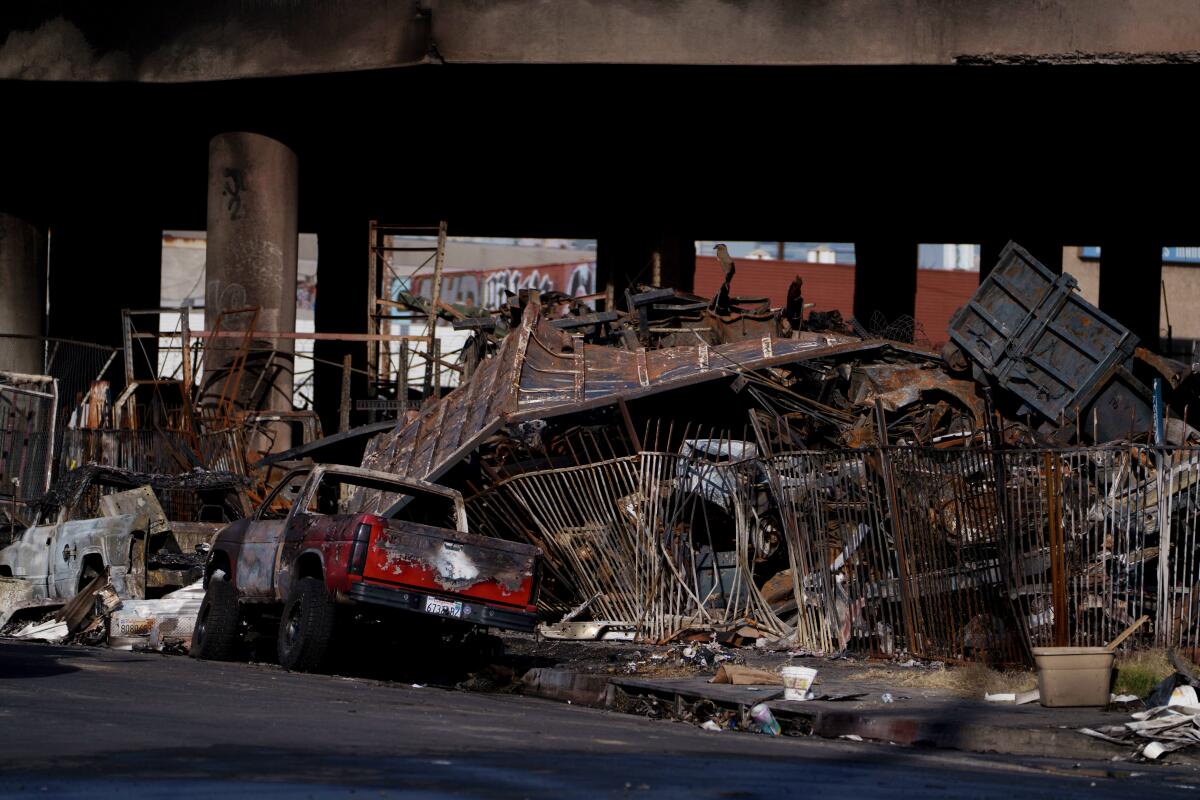Caltrans’ lapses contributed to 10 Freeway fire, its inspector general finds

- Share via
Infrequent and haphazard inspections by Caltrans allowed for the conditions that caused the massive fire that shut down the 10 Freeway downtown last year, costing $33 million, according to a new report from the agency’s inspector general.
In the damning assessment, Bryan Beyer and his chief deputy, Diana Antony, laid out how the California Department of Transportation brushed off two major “warning signs” of the potential fire danger at property it leased under and adjacent to freeways.
The report also found the agency kept shoddy lease records, failed to complete annual inspections or collect rent and never took meaningful action after finding hazardous conditions at the site.
“Caltrans could have — and should have — done more to make this property safer for the motoring public who traveled above it,” the report said. “Although we do not believe Caltrans was directly responsible for the November 2023 fire, it nevertheless could have played a larger role in its prevention.”
Since the fire, Caltrans said, it has implemented new oversight measures and imposed stricter requirements for prospective tenants of so-called airspace properties, often located under freeway viaducts.
“Safety is Caltrans’ top priority, and the department takes the results of this audit report seriously,” said Edward Barrera, a Caltrans spokesperson, in an emailed statement.
The agency has “paused approving any new leases, subleases, and renewals of open storage properties and will review other recommendations to protect the state highway system and the traveling public as its assessment of the Airspace program continues.”
The downtown fire broke out on a chilly morning at one of the airspace Caltrans properties, where piles of wooden pallets fueled flames that raged under the freeway viaduct for hours. An arsonist was blamed for the fire, but no arrest was ever made.
About a dozen mostly immigrant business owners operated shops on the property off of Lawrence Street, making their livelihood storing and selling pallets, recycling, fixing cars and supplying fixtures to the nearby garment industry. Some maintained flammable liquid that added fuel to the fire.
They rented their spots from a private company, Apex, owned by Ahmad Anthony Nowaid, who leased the land from Caltrans.
Neither the subletting nor the storage of flammable materials was legal under the Caltrans lease, but the agency failed time and again to enforce its own rules, the report found.
“Caltrans had ample opportunities over the years to consider taking various forms of legal action, but neglected to do so,” the report found. “Caltrans must consider whether it can effectively manage these types of airspace leases while adequately protecting the public from the potential fire danger that some of them may present.”
The agency leased out the 48,000-square-foot triangular lot to Apex since 2008. During that time, the agency conducted five of the 15 required annual inspections and kept poor records of them.
“Even when it did conduct inspections and found serious safety conditions, Caltrans failed to follow through on them, which perpetuated the potential risks to public safety,” the report found.
In 2013 and 2015, there were five apparent “inspection-related” activities documented, but no photos or notes taken, only a comment, “no violations.” Yet, images taken from Google Street View show the lease was out of compliance with state requirements. Pallets were stacked high under the freeway and a “for rent” sign was hung.
“If Caltrans had performed even a perfunctory level of on-site activity or inspections at these times, it seems reasonable that it would have — at a minimum — identified some of the issues that were visible in the photographic images and required the Tenant to address them,” the report said.
Then in March 2017, a massive fire in Atlanta collapsed Interstate 85, causing federal authorities to warn transportation agencies of the danger of “storing materials under bridges.” The Federal Highway Administration encouraged inspectors at transportation agencies around the nation to be mindful of this. Caltrans put in place a “structure policy directive,” which among other things reemphasized the long-standing prohibition of flammable materials being stored under bridges without approval.
“Despite this warning and the new policy directive, there were no other inspection-related activities at the Lawrence Airspace until February 2020, which was approximately five years from its last inspection and more than three years from the date of the fire in Atlanta,” the report stated.
The inspector that February noted the prohibited subletters and took pictures of “countless stacks of wooden pallets,” but never sent any notice to the tenant of the violations. The inspector general called it another “missed opportunity.”
Six months later there were two additional inspections, a stormwater inspection and a “developmental inspection.” In the latter inspection, the wrong form was used — although this was the first inspection from which the inspector general found actual reports. Despite the red flags, none of the inspectors called for any “corrective action.”
A year later, in August 2021, Caltrans sent a letter to the tenant about a spot inspection that found flammable liquids being stored in close proximity to other flammable materials. The agency ordered the tenant to correct what it called “major deficiencies” no later than Sept. 1, 2021. Then there was another spot inspection on Sept. 14, 2021, that found nothing changed. An agent warned that the property had to be fixed by Oct. 31.
“After this deadline expired, Caltrans once again did not appear to follow its guidelines: It had no record of whether it had followed up with the Tenant in writing nor did it have any documentation indicating that the Tenant had removed the flammable materials from the site,” the report stated.
It was another “missed opportunity,” the report stated. “Instead, Caltrans demonstrated that its demands had no real consequences.”
In January 2022, district staff asked management to approve a request for eviction, but it was never given to the district director to sign.
By early 2022, there was growing frustration inside the agency. These type of airspace leases are handled by district offices. Some staffers there believed that Caltrans was more interested in protecting the subletters than the public. One former employee told the inspector general that “he and his supervisor struggled to get their management’s approval to take legal action against the tenant.”
The former agent “warned his management about the wooden pallets and that their people-first approach was putting the motoring public in danger.”
Then in April 2022 a fire broke out at an adjacent airspace site, temporarily shutting down the 10 Freeway. But it didn’t seem to “trigger a notable response” or “elicit any sign of urgency” from the agency.
It took four months for another inspection, this time including a series of visits that found “numerous and potentially significant violations, including the presence of dogs, solvents, oils, fuels, multiple high piles of wooden pallets, and other unspecified items prohibited by the lease.”
On September 16, 2022, Caltrans ordered Apex to correct violations within 30 days.
Again, nothing. “Had Caltrans followed through, it might have had a chance to break another link in the chain of causation that resulted in the fire the following year,” the report found.
A year later, the agency filed an unlawful detainer in Los Angeles County Superior Court to evict Apex and seek back rent.
The property was one of five that Caltrans was attempting to oust Apex and another Nowaid company from, including a plot along the 5 Freeway in Sun Valley and another a block away from the one on Lawrence Street. All told, Nowaid owed about $620,000 to Caltrans in unpaid rent as of September, the agency said in court filings.
The inspector general found that on that property alone, Caltrans did not collect “$293,325 of unpaid rent or assess more than $30,000 in late fees, penalties, and interest associated with untimely rent payments.”
According to the report, Caltrans is seeking to collect only one year of the unpaid balance in court but may not be able to collect it all because of a four-year statute of limitations.
There was little mention of the violations in the court filing. One month before the fire erupted, there was another inspection with “numerous lease violations.”
“Caltrans once again appeared to have ignored the conditions, since it had no record of having provided a notice to the tenant or having followed up on the agent’s noted lease violations,” the report stated.
Caltrans has 60 days to provide a corrective action plan. The report is the first in a series on the airspace program.
More to Read
Sign up for Essential California
The most important California stories and recommendations in your inbox every morning.
You may occasionally receive promotional content from the Los Angeles Times.











